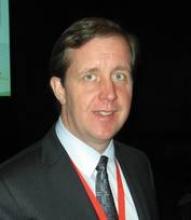Asymptomatic episodes of atrial fibrillation are common in elderly hypertensive patients with pacemakers and no history of clinical AF – and these subclinical atrial tachyarrhythmias are associated with a sharply increased risk of subsequent ischemic stroke.
These were the two major findings of the large, international, randomized ASSERT (Asymptomatic Atrial Fibrillation and Stroke Evaluation in Pacemaker Patients and the Atrial Fibrillation Reduction Atrial Pacing Trial) study.
An important secondary finding was that, disappointingly, continuous atrial overdrive pacing using a programmable algorithm to maintain a paced atrium did not prevent the development of clinical AF, nor did it modify stroke risk, according to Dr. Jeff S. Healey of the Population Health Research Institute at McMaster University in Hamilton, Ont.
ASSERT enrolled 2,580 patients in 23 countries. All were aged 65 years or older, were hypertensive, and had recently received a dual-chamber pacemaker or implantable cardioverter-defibrillator. None of the subjects had a history of AF at enrollment.
In the first 3 months of follow-up, 10.1% of study participants developed device-detected subclinical AF (defined as an atrial rate in excess of 190 beats per minute lasting for more than 6 minutes). As a practical matter, it’s worth noting that the median time to implanted device–detected asymptomatic AF in this subgroup was 36 days. Thus, several days of negative Holter monitoring would have made for false reassurance, the cardiologist noted.
The subgroup with asymptomatic AF during the first 3 months had a 5.6-fold increased risk of developing clinical AF during a mean 2.5 years of prospective follow-up. Moreover, the rate of ischemic stroke or systemic embolism in patients with subclinical AF in the first 3 months was 1.7% per year, compared with 0.69% annually in the rest of the ASSERT participants.
The population attributable risk (PAR) of stroke or systemic embolism associated with asymptomatic AF in the first 3 months was 13%. Of note, that’s similar to the PAR of stroke that is associated with clinical AF in the Framingham Heart Study.
In a multivariate analysis adjusted for the standard predictors of stroke, device-detected subclinical AF during the first 3 months of the study was independently associated with a 2.5-fold increased subsequent risk of stroke. And this may well underestimate the true magnitude of risk, since more than half of ASSERT participants were on aspirin at baseline and 18% of those with early subclinical AF received warfarin during the follow-up period.
Both of these venerable drugs are clearly effective in reducing stroke risk in patients with established clinical AF, although it’s not known whether these agents also have a net benefit in patients with subclinical AF. A randomized trial testing this hypothesis by using these drugs or newer anticoagulants should be a priority, Dr. Healey said (N. Engl. J. Med. 2012;366:120-9).
Subjects with a CHADS2 score greater than 2 plus subclinical AF detected in the first 3 months of the study had a rate of ischemic stroke or systemic embolism of 3.7% per year, compared with 0.97% per year in patients with a similarly elevated CHADS2 score but no early subclinical atrial tachyarrhythmia.
In addition to the 10% of ASSERT participants who developed subclinical AF during the initial 3 months of follow-up, another 24% did so later.
Episodes of asymptomatic AF briefer than 6 minutes were not catalogued in the study, so it remains unknown if they, too, are associated with increased subsequent stroke risk.
At the study’s outset, all subjects with pacemakers were randomized to continuous atrial overdrive pacing or to having this feature switched off for the duration. The atrial pacing intervention did not affect the rate of development of clinical AF, although the trial was underpowered for this outcome.
The ASSERT study was supported by St. Jude Medical. Dr. Healey disclosed that he has served as a paid consultant to that company, Boehringer Ingelheim, and Bayer, as well receiving grant support from AstraZeneca, Boston Scientific, and Boehringer Ingelheim. Dr. Lamas declared having no relevant financial interests.


